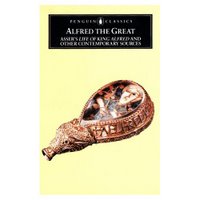Alfred the Great, King of the West-Saxons
Also known as Ælfred
Died: October 899
Commemorated: October 26
In art, he is shown as a King in full armor with a crowned helmet
ALFRED the GREAT, KING OF THE SAXONS
http://www.request.org.uk/main/history/saxon/alfred01.htm
Alfred was a remarkable man. A brave and hardened warrior, he had grown up fightingthe Danes at the side of his father and brothers who had been kings before him. A great leader and clever organiser, he was also - thanks to his mother - able to read in an age when few people could. He was educated, cultured and a gifted musician. He was also a devout Christian who had seen churches and monasteries destroyed and monks and priests slaughtered throughout the land by the invading Vikings. Was this to be the end of the Christian faith in these islands?
In January 878 Guthrum's Danish army had broken a treaty, and defeated Alfred in a surprise attack at Chippenham while the Saxons celebrated the end of the twelve days of Christmas. Every Saxon Kingdom had now fallen to the invading Vikings, and Alfred's two forts were all that remained of Saxon England.
In March, King Alfred oversaw the remains of his broken army digging earthwork defences around the tiny inland islands of Athelney and nearby Lyng, areas of higher ground surrounded by the miles of flooded marshland that were the Somerset Levels.The story of Alfred burning the cakes dates from this time. While he was sheltering in the home of a herdsman, the herdsman's wife asked him to watch some cakes that were being baked. Alfred was so distracted by his desperate worries that he forgot the cakes and they were badly burned. Not knowing who he was, the woman returned and angrily shouted at him. Alfred meekly accepted the telling off.
--------------------------------
Alfred the Great, King of the West Saxons, 26 October 899
http://elvis.rowan.edu/~kilroy/JEK/10/26.html
When the Gospel was first preached in Britain, the island was inhabited by Celtic peoples. In the 400's, pagan Germanic tribes, the Angles, Saxons, and Jutes, invaded Britain and drove the Christian Celts out of what is now England into Wales, Scotland, and Ireland. The new arrivals (called collectively the Anglo-Saxons) were then converted by Celtic missionaries moving in from the one side and Roman missionaries moving in from the other. (They then sent missionaries of their own, such as Boniface, to their pagan relatives on the Continent.)In the 800's the cycle partly repeated itself, as the Christian Anglo-Saxons were invaded by the Danes, pagan raiders, who rapidly conquered the northeast portion of England. They seemed about to conquer the entire country and eliminate all resistance when they were turned back by Alfred, King of the West Saxons.
Alfred was born in 849 at Wantage, Berkshire, youngest of five sons of King Aethelwulf. He wished to become a monk, but after the deaths (all in battle, I think) of his father and his four older brothers, he was made king in 871. He proved to be skilled at military tactics, and devised a defensive formation which the Danish charge was unable to break. After a decisive victory at Edington in 878, he reached an agreement with the Danish leader Guthrum, by which the Danes would retain a portion of northeastern England and be given other concessions in return for their agreement to accept baptism and Christian instruction. From a later point of view, it seems obvious that such a promise could not involve a genuine change of heart, and was therefore meaningless (and indeed, one Dane complained that the white robe that he was given after his baptism was not nearly so fine as the two that he had received after the two previous times that he had been defeated and baptized). However, Alfred's judgement proved sound. Guthrum, from his point of view, agreed to become a vassal of Christ. His nobles and chief warriors, being his vassals, were thereby obligated to give their feudal allegiance to Christ as well. They accepted baptism and the presence among them of Christian priests and missionaries to instruct them. The door was opened for conversions on a more personal level in that and succeeding generations.
In his later years, having secured a large degree of military security for his people, Alfred devoted his energies to repairing the damage that war had done to thecultural life of his people. He translated Boethius's Consolations of Philosophy into Old English, and brought in scholars from Wales and the Continent with whose help various writings of Bede, Augustine of Canterbury, and Gregory the Great were likewise translated. He was much impressed by the provisions in the Law of Moses for the protection of the rights of ordinary citizens, and gave order that similar provisions should be made part of English law. He promoted the education of the parish clergy. In one of his treatises, he wrote:
"He seems to me a very foolish man, and very wretched, who will not increase his understanding while he is in the world, and ever wish and long to reach that endless life where all shall be made clear."
He died on 26 October 899, and was buried in the Old Minster at Winchester. Alone among English monarchs, he is known as "the Great."
Further Reading:

Links

Jay:
ReplyDeleteGreat stuff! Alfred is one of my heroes. His life would make a great film--odd that no one's tried that yet.
I think a movie based on The Ballad of the White Horse could be terrific, given the right director.
ReplyDeleteSay, Mel Gibson?